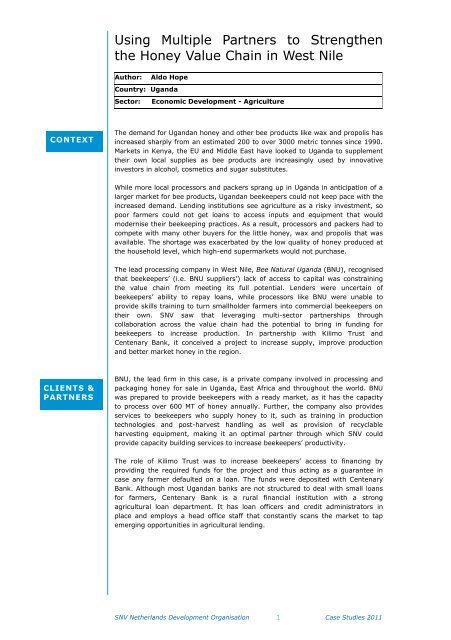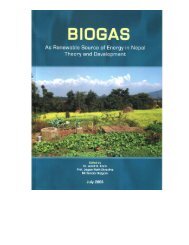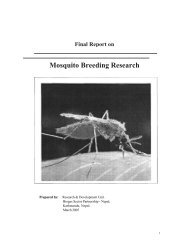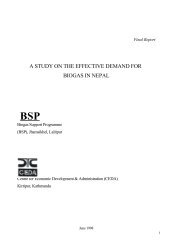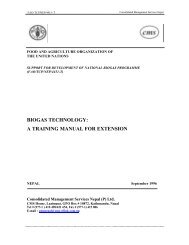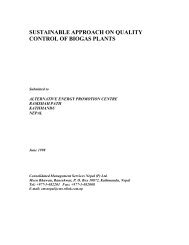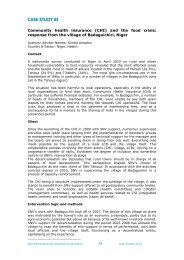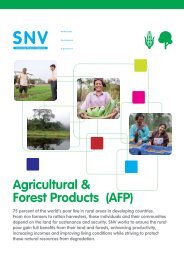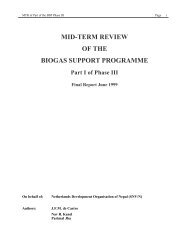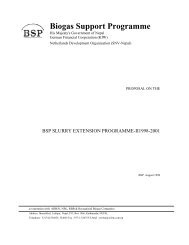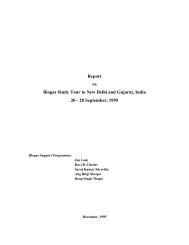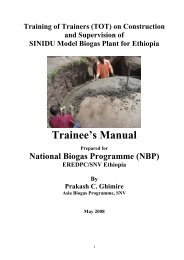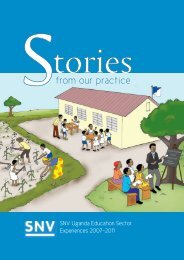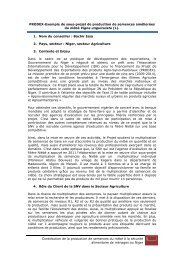Using Multiple Partners to Strengthen the Honey Value Chain ... - SNV
Using Multiple Partners to Strengthen the Honey Value Chain ... - SNV
Using Multiple Partners to Strengthen the Honey Value Chain ... - SNV
You also want an ePaper? Increase the reach of your titles
YUMPU automatically turns print PDFs into web optimized ePapers that Google loves.
CONTEXT<br />
CLIENTS &<br />
PARTNERS<br />
<strong>Using</strong> <strong>Multiple</strong> <strong>Partners</strong> <strong>to</strong> <strong>Streng<strong>the</strong>n</strong><br />
<strong>the</strong> <strong>Honey</strong> <strong>Value</strong> <strong>Chain</strong> in West Nile<br />
Author: Aldo Hope<br />
Country: Uganda<br />
Sec<strong>to</strong>r: Economic Development - Agriculture<br />
The demand for Ugandan honey and o<strong>the</strong>r bee products like wax and propolis has<br />
increased sharply from an estimated 200 <strong>to</strong> over 3000 metric <strong>to</strong>nnes since 1990.<br />
Markets in Kenya, <strong>the</strong> EU and Middle East have looked <strong>to</strong> Uganda <strong>to</strong> supplement<br />
<strong>the</strong>ir own local supplies as bee products are increasingly used by innovative<br />
inves<strong>to</strong>rs in alcohol, cosmetics and sugar substitutes.<br />
While more local processors and packers sprang up in Uganda in anticipation of a<br />
larger market for bee products, Ugandan beekeepers could not keep pace with <strong>the</strong><br />
increased demand. Lending institutions see agriculture as a risky investment, so<br />
poor farmers could not get loans <strong>to</strong> access inputs and equipment that would<br />
modernise <strong>the</strong>ir beekeeping practices. As a result, processors and packers had <strong>to</strong><br />
compete with many o<strong>the</strong>r buyers for <strong>the</strong> little honey, wax and propolis that was<br />
available. The shortage was exacerbated by <strong>the</strong> low quality of honey produced at<br />
<strong>the</strong> household level, which high-end supermarkets would not purchase.<br />
The lead processing company in West Nile, Bee Natural Uganda (BNU), recognised<br />
that beekeepers’ (i.e. BNU suppliers’) lack of access <strong>to</strong> capital was constraining<br />
<strong>the</strong> value chain from meeting its full potential. Lenders were uncertain of<br />
beekeepers’ ability <strong>to</strong> repay loans, while processors like BNU were unable <strong>to</strong><br />
provide skills training <strong>to</strong> turn smallholder farmers in<strong>to</strong> commercial beekeepers on<br />
<strong>the</strong>ir own. <strong>SNV</strong> saw that leveraging multi-sec<strong>to</strong>r partnerships through<br />
collaboration across <strong>the</strong> value chain had <strong>the</strong> potential <strong>to</strong> bring in funding for<br />
beekeepers <strong>to</strong> increase production. In partnership with Kilimo Trust and<br />
Centenary Bank, it conceived a project <strong>to</strong> increase supply, improve production<br />
and better market honey in <strong>the</strong> region.<br />
BNU, <strong>the</strong> lead firm in this case, is a private company involved in processing and<br />
packaging honey for sale in Uganda, East Africa and throughout <strong>the</strong> world. BNU<br />
was prepared <strong>to</strong> provide beekeepers with a ready market, as it has <strong>the</strong> capacity<br />
<strong>to</strong> process over 600 MT of honey annually. Fur<strong>the</strong>r, <strong>the</strong> company also provides<br />
services <strong>to</strong> beekeepers who supply honey <strong>to</strong> it, such as training in production<br />
technologies and post-harvest handling as well as provision of recyclable<br />
harvesting equipment, making it an optimal partner through which <strong>SNV</strong> could<br />
provide capacity building services <strong>to</strong> increase beekeepers’ productivity.<br />
The role of Kilimo Trust was <strong>to</strong> increase beekeepers’ access <strong>to</strong> financing by<br />
providing <strong>the</strong> required funds for <strong>the</strong> project and thus acting as a guarantee in<br />
case any farmer defaulted on a loan. The funds were deposited with Centenary<br />
Bank. Although most Ugandan banks are not structured <strong>to</strong> deal with small loans<br />
for farmers, Centenary Bank is a rural financial institution with a strong<br />
agricultural loan department. It has loan officers and credit administra<strong>to</strong>rs in<br />
place and employs a head office staff that constantly scans <strong>the</strong> market <strong>to</strong> tap<br />
emerging opportunities in agricultural lending.<br />
<strong>SNV</strong> Ne<strong>the</strong>rlands Development Organisation 1 Case Studies 2011
INTERVENTION<br />
LOGIC AND<br />
METHOD<br />
Partner Role<br />
Beekeepers • Provide honey for <strong>the</strong> market<br />
• Sell honey <strong>to</strong> BNU on contractual arrangement and pay<br />
back hive loans<br />
Bee Natural Uganda • Provides a market for <strong>the</strong> honey<br />
• Purchases honey and o<strong>the</strong>r bee products<br />
• Collects honey from collection centres and beekeepers<br />
• Assists in assessment of beekeepers for loans<br />
• Trains farmers in group management and production<br />
technologies<br />
District local<br />
governments<br />
• Oversee intervention so that it aligns with government<br />
strategies<br />
• Serve on <strong>the</strong> district level steering committee, which<br />
provides recourse <strong>to</strong> higher leadership<br />
Kilimo Trust • Finances project activities<br />
• Supports <strong>the</strong> project at <strong>the</strong> oversight level<br />
• Integrates <strong>the</strong> project with emerging agricultural<br />
<strong>the</strong>mes (e.g. climate change and food security)<br />
• Replicates <strong>the</strong> project in a way that addresses lessons<br />
learned in this pilot<br />
Centenary Bank • Assesses farmers’ eligibility for credit<br />
• Opens accounts for interested farmers<br />
• Trains beekeepers in loan management<br />
• Provides loans <strong>to</strong> farmers in <strong>the</strong> form of beekeeping<br />
equipment<br />
• Recovers loans from farmers<br />
<strong>SNV</strong> Uganda • Leads implementation of <strong>the</strong> project<br />
• Provides capacity development for beekeepers, such as<br />
skills training<br />
• Forms linkages with public, private and civil society<br />
stakeholders<br />
• Co-funds <strong>the</strong> project<br />
The goal of <strong>the</strong> intervention was <strong>to</strong> increase <strong>the</strong> incomes of West Nile farmer<br />
groups through improved beekeeping. It sought <strong>to</strong> assist 600-1200 beekeepers <strong>to</strong><br />
increase production <strong>to</strong> 15 kg of high-quality honey per season and sell it directly<br />
<strong>to</strong> processors.<br />
In an effort <strong>to</strong> link ac<strong>to</strong>rs in <strong>the</strong> value chain who could help each o<strong>the</strong>r, <strong>SNV</strong><br />
began <strong>the</strong> intervention by facilitating a multi-stakeholder platform (MSP) with<br />
stakeholders <strong>to</strong> determine capacity gaps in <strong>the</strong> value chain and analyse <strong>the</strong>ir root<br />
causes. <strong>SNV</strong> could <strong>the</strong>n facilitate an intervention <strong>to</strong> overcome <strong>the</strong> low production<br />
levels in <strong>the</strong> honey sub-sec<strong>to</strong>r by tackling <strong>the</strong>se root causes. During this<br />
facilitation process, it became clear that <strong>the</strong>re were four causes <strong>to</strong> gaps in <strong>the</strong><br />
production end of <strong>the</strong> value chain.<br />
First, farmers were not sharing good practices with each o<strong>the</strong>r. Regional<br />
beekeepers had no unifying body, so <strong>the</strong>re was no mechanism <strong>to</strong> collaborate. The<br />
<strong>SNV</strong> intervention addressed this by streng<strong>the</strong>ning producer groups and planning<br />
exchange visits with o<strong>the</strong>r farmer groups. Steering committees oversaw <strong>the</strong><br />
project at different levels and were instrumental in acting as entry points for<br />
service providers <strong>to</strong> reach out <strong>to</strong> <strong>the</strong>ir localities. Fur<strong>the</strong>r, <strong>to</strong> ensure group<br />
cohesion, <strong>the</strong> West Nile Private Sec<strong>to</strong>r Company, which works on development<br />
issues, piloted community-based financial services (such as village savings and<br />
loans) <strong>to</strong> generate seed money for productive activities. This process has not only<br />
helped members save for agricultural production but also streng<strong>the</strong>ned group<br />
cohesion by incentivising collaboration.<br />
Second, farmers could not access extension services. To address this, local<br />
capacity builders (LCBs) first sensitised beekeepers on <strong>the</strong> value of adopting new<br />
practises and provided training on using modern beekeeping technologies and<br />
methods, such as higher-quality hives that increase colonisation rates or foodgrade<br />
containers that decrease post-harvest loss. To sustain <strong>the</strong> process, <strong>the</strong>y<br />
<strong>SNV</strong> Ne<strong>the</strong>rlands Development Organisation 2 Case Studies 2011
OUTCOMES<br />
also built <strong>the</strong> capacity of some farmers <strong>to</strong> become private sec<strong>to</strong>r service providers<br />
who advise fellow beekeepers for a fee.<br />
Third, most beekeepers had little or no links <strong>to</strong> equipment suppliers. The<br />
intervention provided farmer groups with hives and <strong>to</strong>ols and also increased<br />
groups’ access <strong>to</strong> credit and suitable value chain finance. However, some of <strong>the</strong><br />
hives supplied by East African Beekeepers began warping. This challenge was<br />
overcome when <strong>the</strong> supplier agreed <strong>to</strong> replace <strong>the</strong> bad hives and Centenary Bank<br />
provided a line of credit <strong>to</strong> <strong>the</strong> manufacturer <strong>to</strong> ensure <strong>the</strong> business had adequate<br />
working capital. The manufacturer’s hives had over a 90% rate of colonisation, as<br />
<strong>the</strong>y were pre-baited with wax <strong>to</strong> attract <strong>the</strong> bees.<br />
Last, <strong>the</strong> farmers lacked information on up-<strong>to</strong>-date market prices. The LCB<br />
trained farmers <strong>to</strong> use mobile phones <strong>to</strong> compare market prices in <strong>the</strong>ir area. The<br />
intervention also established a system of community-led honey marketing.<br />
Specific locations in <strong>the</strong> community have been targeted for use as honey<br />
collection centres so that <strong>the</strong> bulked honey can be easily marketed and<br />
transported <strong>to</strong> <strong>the</strong> fac<strong>to</strong>ry.<br />
Yet addressing <strong>the</strong>se issues was not enough <strong>to</strong> bridge <strong>the</strong> gap between low supply<br />
and high demand. To truly commercialise <strong>the</strong>ir apiaries, smallholder farmers who<br />
had a sideline in honey production needed funds <strong>to</strong> scale up production. Kilimo<br />
Trust and Centenary Bank provided loans in <strong>the</strong> form of beekeeping equipment,<br />
confident that <strong>the</strong>ir financial investment would be repaid because BNU and <strong>SNV</strong><br />
worked with beekeepers <strong>to</strong> maximise production. The loan beneficiaries had 18<br />
months <strong>to</strong> streng<strong>the</strong>n <strong>the</strong>ir colonies and begin harvesting honey from <strong>the</strong>ir new<br />
hives, at which point <strong>the</strong>y had <strong>to</strong> repay <strong>the</strong>ir loans <strong>to</strong> Centenary Bank. BNU,<br />
meanwhile, assured <strong>the</strong> farmers <strong>the</strong>y would purchase <strong>the</strong>ir honey, easing<br />
beekeepers’ concerns about <strong>the</strong> profitability of <strong>the</strong> enterprise.<br />
The remainder of <strong>the</strong> intervention will focus on training beekeepers in queen<br />
rearing and colony multiplication; mapping beekeepers and <strong>the</strong>ir hives using<br />
advanced GPS technology; streng<strong>the</strong>ning <strong>the</strong> management information system of<br />
<strong>the</strong> project; building <strong>the</strong> capacity of local extension workers; and streng<strong>the</strong>ning<br />
collection centres <strong>to</strong> serve as community-based honey marketing systems.<br />
This project is ongoing, so it is <strong>to</strong>o early <strong>to</strong> make final rulings. However,<br />
addressing <strong>the</strong>se gaps has led <strong>to</strong> better linkages between stakeholders, improved<br />
apiary practices among beekeepers and increased capacity of beekeeping<br />
extension workers in <strong>the</strong> community. There are several observable positive<br />
outcomes:<br />
� Beekeepers’ skills have increased due <strong>to</strong> trainings from LCBs working<br />
with <strong>SNV</strong>. 715 farmers have been trained in modern apiculture practices<br />
and honey production—and appreciate <strong>the</strong> benefits of <strong>the</strong>se improved<br />
methods. Teaching farmers improved apiary management practices has<br />
led <strong>to</strong> increased production for <strong>the</strong> hives <strong>the</strong> beekeepers owned prior <strong>to</strong><br />
<strong>the</strong> intervention.�<br />
� Beekeepers have acquired knowledge about entrepreneurship, marketing,<br />
apiary management and record-keeping.�<br />
� The project started with a 95% colonisation rate. This rate reduced as<br />
some of <strong>the</strong> bees in Kijomoro escaped due <strong>to</strong> overzealous beekeepers<br />
crowding many hives within one location, which starved off several<br />
colonies and forced <strong>the</strong>m <strong>to</strong> move elsewhere. However, <strong>the</strong> average<br />
colonisation rate remained at about 85% before improving <strong>to</strong> 90% during<br />
<strong>the</strong> latest swarming season due <strong>to</strong> good apiary management practices by<br />
<strong>the</strong> beekeepers.�<br />
<strong>SNV</strong> Ne<strong>the</strong>rlands Development Organisation 3 Case Studies 2011
IMPACT<br />
LESSONS<br />
LEARNED<br />
� Farmers’ capacities <strong>to</strong> handle loans have been streng<strong>the</strong>ned. The<br />
agricultural loan officers trained, assessed and opened accounts for <strong>the</strong><br />
beekeepers. To date, loans have been disbursed <strong>to</strong> 19 beekeepers and an<br />
additional 105 farmers have been assessed <strong>to</strong> benefit from <strong>the</strong> scheme.<br />
In <strong>to</strong>tal, USD $18,000 worth of loans have been given out in <strong>the</strong> form of<br />
468 hives. (The number might have been higher, but Centenary Bank<br />
experienced an unforeseen shortage of manpower that slowed down its<br />
progress in handing out loans. The bank has since moved quickly <strong>to</strong><br />
appoint new officials <strong>to</strong> work on <strong>the</strong> project and <strong>the</strong> credit reference<br />
procedures are now moving smoothly.) The goal for 2011 is <strong>to</strong> supply<br />
300 beekeepers with loans in <strong>the</strong> form of 7,500 hives.�<br />
� BNU has streng<strong>the</strong>ned its relationship with <strong>the</strong> beekeepers so <strong>the</strong>y can<br />
continue working <strong>to</strong>ge<strong>the</strong>r for mutual long-term benefit. BNU has<br />
continued <strong>to</strong> buy from <strong>the</strong> farmers and support capacity-building<br />
activities.�<br />
The project has had a positive impact in <strong>the</strong> following areas:<br />
• <strong>Using</strong> newer hives with better practices has increased farmers’ incomes.<br />
BNU purchased 80 metric <strong>to</strong>nnes this season from West Nile farmers for<br />
processing and marketing—an increase of 30 <strong>to</strong>nnes over <strong>the</strong> previous<br />
year. The beekeepers grossed over USD $90,000 from <strong>the</strong>se sales<br />
because market prices kept rising throughout <strong>the</strong> season as honey<br />
supplies ran low.<br />
• The increased income has helped farmers see <strong>the</strong> benefit of adopting<br />
large-scale commercial beekeeping practices. Over 10 farmers own at<br />
least 50 hives apiece. One farmer even has 400 hives.<br />
• A presidential advisor on agriculture recently visited <strong>the</strong> project and was<br />
impressed with <strong>the</strong> market model being used. Indeed, as <strong>the</strong> region<br />
begins <strong>to</strong> dominate in beekeeping, it is attracting <strong>the</strong> attention of<br />
policymakers and external markets, who want <strong>to</strong> learn from <strong>the</strong> model<br />
and replicate it, ei<strong>the</strong>r with honey enterprises or across o<strong>the</strong>r value<br />
chains. Inspired Africa, an agriculture consulting firm in Uganda, is using<br />
<strong>the</strong> model in its maize interventions in Masindi. Over 3,000 farmers will<br />
grow maize and supply <strong>to</strong> millers in Kawempe.<br />
Whereas it is true that <strong>the</strong> project is still at an early stage—<strong>the</strong> multiple<br />
partnerships seem <strong>to</strong> be effectively creating synergies that leverage better<br />
performance of <strong>the</strong> value chain. When replicating <strong>the</strong> project, <strong>the</strong> following<br />
lessons should be considered:<br />
� When a market is assured for a product and <strong>the</strong> profitability and gross<br />
margins are positive, partners find it easy <strong>to</strong> collaborate.<br />
� <strong>Partners</strong>hips come with challenges, as in this case. Any one partner has<br />
little control over <strong>the</strong> activity of <strong>the</strong> o<strong>the</strong>r partners, which can lead <strong>to</strong><br />
setbacks. If <strong>the</strong>se setbacks are not addressed, project goals may not be<br />
met.<br />
� Moni<strong>to</strong>ring and evaluation has been easy due <strong>to</strong> <strong>the</strong> fact that <strong>the</strong> project<br />
is small. However, as <strong>the</strong> project increases in scope, partners must<br />
develop new strategies <strong>to</strong> capture data and enable quick decision making.<br />
This has already begun through <strong>the</strong> use of GPS <strong>to</strong> capture hive<br />
coordinates.<br />
� Agricultural loan administration does not easily fit within Uganda’s current<br />
banking system. Although it takes about 18 months (three seasons) for<br />
<strong>the</strong> hives given out <strong>to</strong> farmers <strong>to</strong> yield strong colonies and become<br />
<strong>SNV</strong> Ne<strong>the</strong>rlands Development Organisation 4 Case Studies 2011
SUSTAINABILITY<br />
STANDARD DATA<br />
productive, <strong>the</strong> loan agreements between <strong>the</strong> beekeepers and Centenary<br />
Bank only have an eight month grace period. Thus, <strong>the</strong> beekeepers have<br />
been using older hives and alternative funding sources <strong>to</strong> make<br />
repayments once <strong>the</strong> eight months have elapsed. Centenary Bank has<br />
acknowledged that financing beekeeping requires greater flexibility for<br />
loan recovery. It is giving extensions while <strong>the</strong> colonies streng<strong>the</strong>n and<br />
begin producing honey.<br />
� Appraising beekeepers has been a challenge for <strong>the</strong> agricultural loan<br />
officers as many farmers live in remote areas.<br />
� Most farmers do not see beekeeping as a full-time job. Thus, large-scale<br />
commercial beekeeping has not yet taken off, making it difficult for <strong>the</strong><br />
project <strong>to</strong> rely on <strong>the</strong> beekeepers, who often go long stretches without<br />
visiting <strong>the</strong>ir apiaries. By <strong>the</strong> time <strong>the</strong>y do, <strong>the</strong>y may find that pests like<br />
ants and rodents have disturbed <strong>the</strong> bees and forced <strong>the</strong>m <strong>to</strong> flee.<br />
� Farmers are tempted <strong>to</strong> renege on long-term arrangements when <strong>the</strong>re<br />
are price fluctuations in <strong>the</strong> market. BNU has addressed this problem by<br />
purchasing honey at <strong>the</strong> prevailing market rates, earning beekeepers’<br />
loyalty and trust. As honey production increases, prices will stabilise due<br />
<strong>to</strong> supply and demand. <strong>SNV</strong> will lead in enabling beekeepers <strong>to</strong> adopt<br />
entrepreneurial methods and easily calculate <strong>the</strong>ir gross margins. It will<br />
also encourage farmers <strong>to</strong> work with firms <strong>to</strong> develop long-term<br />
relationships ra<strong>the</strong>r than seek out short-term gains.<br />
� High inflation has had an effect on beekeeping’s profitability. The hive<br />
supplier increased hives prices from 65,000 Ugandan shillings (€19) <strong>to</strong><br />
70,000 (€20.50), inclusive of transportation <strong>to</strong> a project site in Arua.<br />
� As a result of <strong>the</strong> slow pace taken for <strong>the</strong> colony <strong>to</strong> become strong<br />
enough before producing adequate volumes of honey, <strong>the</strong> project is<br />
pursuing training for selected beekeepers in bee queen rearing and<br />
colony multiplication. The idea is <strong>to</strong> use <strong>the</strong> reared queen <strong>to</strong> streng<strong>the</strong>n<br />
<strong>the</strong> colonies. The queen rearing training will be conducted by experienced<br />
International Centre of Insect Physiology and Ecology (ICIPE) trainers in<br />
Nairobi, Kenya.�<br />
This innovation is sustainable because it is market-led and beneficial <strong>to</strong> all<br />
members of <strong>the</strong> value chain. Still, donors are needed <strong>to</strong> provide loan guarantees<br />
for rural farmers without bank accounts. Bee Natural Uganda’s CEO made a<br />
presentation about <strong>the</strong> intervention <strong>to</strong> Kilimo Trust’s main donor, who appreciated<br />
<strong>the</strong> work done and requested <strong>the</strong> project be scaled up <strong>to</strong> benefit more farmers.<br />
Start and end date of Memorandum<br />
of Understanding<br />
Assignment Agreement<br />
1 st August 2009 – 1 st September 2011<br />
1 st January 2011 - 31 st December 2011<br />
Composition of <strong>SNV</strong> team Aldo Hope, Agaba Anthony, Apollo Muyanja<br />
Number of primary process days<br />
<strong>SNV</strong> advisors till date<br />
Number of primary process days<br />
LCB till date<br />
120 PPD<br />
70 PPD<br />
Involved partnerships <strong>SNV</strong>, BNU, Kilimo Trust, Centenary Bank<br />
Financial resources invested<br />
(except PPD)<br />
Kilimo Trust: USD $16,000; <strong>SNV</strong>: USD<br />
$35,500; Kilimo Guarantee Fund <strong>to</strong><br />
Centenary Bank: USD $34,000<br />
<strong>SNV</strong> Ne<strong>the</strong>rlands Development Organisation 5 Case Studies 2011


